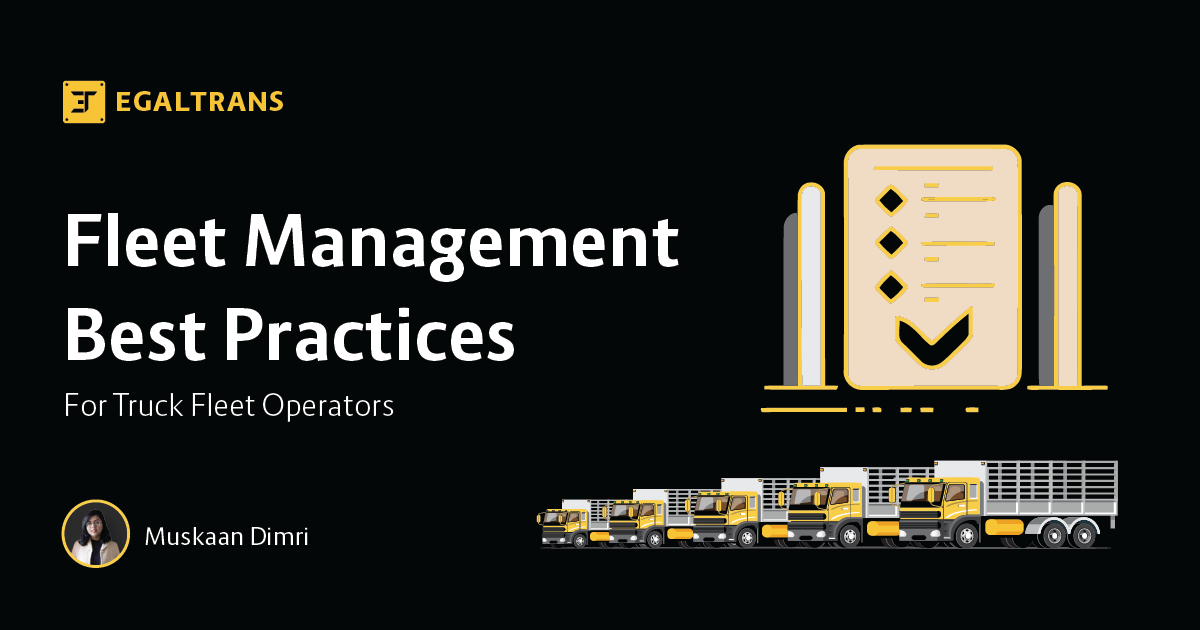Fleet management is an integral part of many businesses, particularly those in logistics, delivery, and transportation industries. Efficient fleet management can lead to significant cost savings, improved customer satisfaction, and enhanced operational efficiency. However, managing a fleet comes with its own set of challenges, from vehicle maintenance and fuel management to driver safety and regulatory compliance. In this blog, we will explore fleet management best practices to help businesses optimize their operations and achieve their goals.
5 Fleet Management Best Practices
Fleet managers are responsible for their trucking fleets and ensure that their fleets are running smoothly, minimizing downtime and maximizing productivity. Here are five best practices that are essential for effective fleet management:
- Regular Maintenance and Inspections
One of the most critical aspects of fleet management is ensuring that all vehicles are regularly maintained and inspected. Regular maintenance helps in identifying potential issues before they become major problems, thereby reducing downtime and repair costs. Create a maintenance schedule that includes routine checks for oil changes, tire rotations, brake inspections, and other essential services. Using fleet management software can help track maintenance schedules and send reminders for upcoming services.
- Implementing Telematics
Telematics systems provide real-time data on vehicle locations, driver behavior, and fuel consumption. By utilizing telematics, fleet managers can monitor and optimize routes, reduce idle times, and improve overall fleet efficiency. Telematics also allows for better communication between drivers and dispatchers, leading to more accurate delivery times and improved customer satisfaction. Additionally, telematics data can be used to identify and address unsafe driving behaviors, contributing to overall road safety.
- Driver Training and Safety Programs
Investing in driver training and safety programs is crucial for fleet management. Well-trained drivers are less likely to be involved in accidents, which can lead to lower insurance premiums and reduced vehicle downtime. Develop comprehensive training programs that cover defensive driving techniques, proper vehicle handling, and adherence to company policies. Regularly update training materials to reflect the latest safety regulations and industry standards.
- Fuel Management
Fuel is one of the largest expenses in fleet management. Implementing effective fuel management strategies can result in significant cost savings. Encourage drivers to adopt fuel-efficient driving habits, such as maintaining steady speeds, avoiding excessive idling, and using cruise control when appropriate. Utilize fuel cards to monitor and control fuel expenses, and consider investing in fuel-efficient vehicles or alternative fuel options to further reduce costs.
- Compliance with Regulations
Fleet managers must stay up-to-date with local, state, and federal regulations that affect their operations. This includes ensuring that all vehicles comply with safety standards, emissions regulations, and licensing requirements. Regular audits and inspections can help identify and address any compliance issues before they result in fines or penalties. Keeping detailed records of all inspections, maintenance, and driver certifications is also essential for regulatory compliance.
Importance of Fleet Management
In India, efficient fleet management is especially critical given the vast and diverse geography, challenging road conditions, and the significant role that trucks play in the country’s economy. Indian trucks are essential for transporting goods across long distances, often through rural and remote areas. Effective fleet management ensures that these trucks operate at peak efficiency, minimizing downtime and maximizing profitability. It helps in reducing operational costs by optimizing routes, maintaining vehicles to prevent breakdowns, and managing fuel consumption. Additionally, with stringent regulatory requirements in place, fleet management ensures compliance with safety and environmental standards, thereby avoiding penalties and enhancing the company’s reputation. In a country where logistics can be complex, robust fleet management practices can lead to timely deliveries, satisfied customers, and a competitive edge in the market.
Effective fleet management is a complex but rewarding endeavor. By implementing best practices such as regular maintenance, telematics, driver training, fuel management, regulatory compliance, and leveraging fleet management software, businesses can optimize their fleet operations, reduce costs, and enhance overall efficiency. Staying proactive and continuously seeking improvements will ensure that your fleet remains a valuable asset to your organization, driving success and growth in a competitive market.






